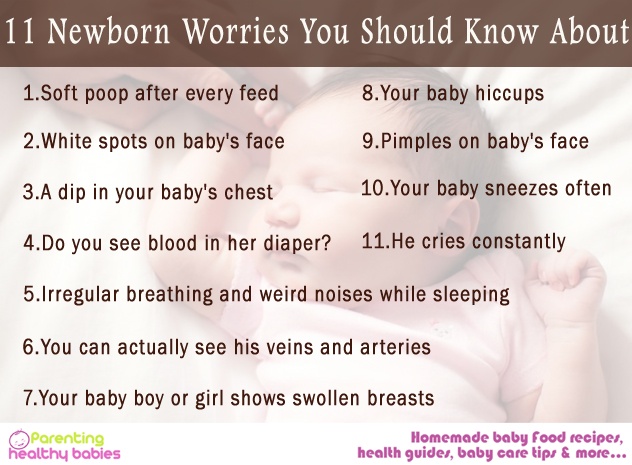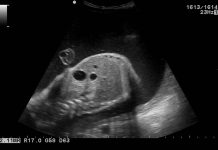Now that motherhood has knocked on your door, you want everything with your newborn to be absolutely perfect. However, there may be times when things seem new and scary. How do you handle such things? Babies cry for a multitude of reasons, so how do you know what’s right or wrong with him? As questions run through your mind regarding how to treat your little fellow, we present here 11 areas of worry that a new parent like you should be aware of:
Read More: 11 Health Benefits of Colostrum for your Newborn
11 Worry Areas of Your Baby to be Aware of:
1. Your baby hiccups
This isn’t anything to worry about–babies do it all the time. Though experts can’t tell the exact cause of baby’s hiccups, yet they know that hiccuping doesn’t harm babies. After a few minutes, the hiccups go away.
2. He cries constantly
Babies express themselves by crying, so you shouldn’t translate that as a cry for help. It only means they are summoning their parents for help with food, milk, or if they feel sleepy, hot or cold or needs a diaper changed. However, if your baby cries so much that anything you do to pacify him doesn’t work, you should speak to your doctor about it. Perhaps, he could be colicky.
3. Your baby sneezes often
If you catch your baby sneezing every now and then, don’t worry about it. It’s all because his tiny body is still trying to adjust to his new environs. Now out of the womb where he was surrounded by fluid, he does feel a little congestion, so give him some time. Babies have tiny noses! Just a small bit of mucus will make them sneeze. And because your newborn has just emerged from his watery home in your uterus, he’s likely to have at least a little congestion, which may cause quite a few sneezes. Unless his sneezing is accompanied by thick, yellow mucus, which indicates a cold, all that sneezing is just a phase he’ll outgrow.
4. You can actually see his veins and arteries
If you find the fontanels covering parts of his skull that haven’t yet joined together, making the arteries and veins visible,don’t worry as this the normal functioning of his circulatory system.
Read More: 11 Tips for Flying with a Newborn
5. Do you see blood in her diaper?
Though strange, you could find a little blood in your newborn baby girl’s diaper, something like a mini period– in week 1 of her life. Despite this, don’t be alarmed by this as it happens only when your estrogen levels are high.
6. Pimples on baby’s face
Since your hormones are still within your baby’s body, it’s possible that your baby shows up a few pimples within the first two weeks and two months of life. These pimples are harmless and only need to be cleaned gently and regularly.
7. Your baby boy or girl shows swollen breasts
The same hormones that lead to baby girls having mini periods also cause infants of both genders to have swollen breasts. However, these aren’t worrisome at all.
8. A dip in your baby’s chest
Don’t be so hyper to imagine this is a heart problem–relax, it isn’t as major as that at all. Experts tell us that the dip that you see is the bottom one-third part of the breastbone that angles backwards. As your baby girl grows, her stomach and chest muscles pull it in place and baby fat layers will cover up the indentation that you see.
9. Soft poop after every feed
If you breastfeed your baby, he may poop after each feed. This happens because breast milk is easily digestible.
Read More: Can I Give Gripe Water to My Newborn Baby?
10. Irregular breathing and weird noises while sleeping
Babies can be extremely noisy while sleeping, so don’t worry if your baby makes weird sounds and has irregular breathing. Normally, babies have a breathing rate of 40 per minute, which could slow down once they sleep. This kind of breathing is normal and moreso because their breathing is still immature.
11. White spots on baby’s face
If you see white spots on your baby’s face, they are identified as being milk spots or milia. They show up when your baby starts developing sweat glands. Not only are these spots harmless, but they will also disappear after the first few weeks.
Armed with these pointers, you will know exactly when to see a pediatrician. Do not ignore even the slightest sign of distress when it comes to a new born baby!
Read More: Bathing your Newborn: 11 Things to Remember
Resources:
http://edition.cnn.com/2007/HEALTH/parenting/03/12/par.baby.worries/
https://www.tinystep.in/blog/top-5-newborn-worries-you-dont-have-to-worry-about













